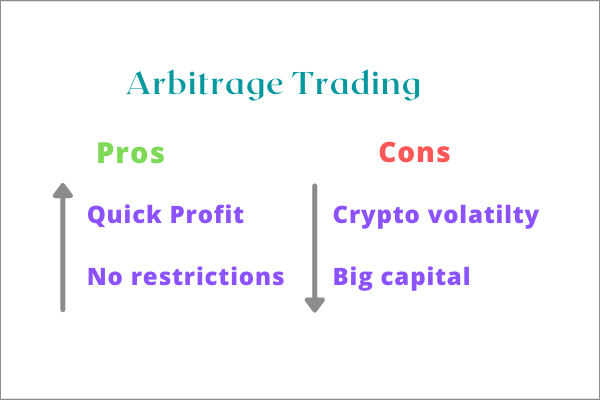In this post, I explained everything there is to know about Arbitrage trading.
If you’ve been avoiding this trade type because it sounds tech, you’re in for a shock.
By the time you’re done reading this post, you’ll realize that you have been missing out on an easy way to make a profit.
Let’s get to business!
Post Summary
- What Is Arbitrage Trading?
- Types Of Arbitrage Trading
- Pros And Cons Of Arbitrage Trading
- FAQs
- Conclusion
Click on any item above to read its details immediately.
1. What Is Arbitrage Trading?

Arbitrage trading is a trading strategy that generates profit by buying an asset in a market and selling it in another at the same time.
The assets traded are the same or similar but their prices are not the same in the markets.
Normally, the price of the asset is the same everywhere but somehow it isn’t.
So, the goal is to buy the asset from the market where the price is low then sell it in the market offering it at a higher price to make a profit.
Here’s a typical example;
Bitcoin is trading at $200 on the Quidax Exchange while, at the same moment, it is trading for $200.50 on Remitano Exchange.
If I buy Bitcoin from Quidax and immediately sell it on Remitano, I’ll earn a profit of 50 cents per unit.
And I can do this for as long as the price differences remain.
Cool, right?
Next, I talked about the types of arbitrage trading.
Keep reading!
Fun fact: an arbitrage trader is also called an arbitrageur
2. Types Of Arbitrage Trading
They are:
- Exchange arbitrage
- Funding rate arbitrage
- Triangular arbitrage
Let’s take them one after the other…
a. Exchange arbitrage
This is the most common type of arbitrage trading.
Here, a trader buys the same crypto asset in one exchange and sells it in another.
Because cryptocurrencies are highly volatile, their prices may differ on exchanges at a particular time.
By looking at the order books for one asset on different exchanges, a trader can detect a price variation and maximize it for profit.
Consequentially, the asset market becomes more efficient as price stays in a manageable range on different trading venues.
Moreover, the arbitrage trader has to be fast before the price reverses.
The example I gave earlier is the exchange type of arbitrage trading.
b. Funding rate arbitrage
In this type of arbitrage trading, a trader buys a cryptocurrency and hedges its price movement with a futures contract.
The futures contract is in the same cryptocurrency.
Also, the funding rate of the contract is lower than the cost (i.e. the transaction fees) of buying the cryptocurrency.
When the trader sells the contract, he gets the same value for the crypto as well as some percent of the funding rate.
For example;
Say you have some XRP but you know that price fluctuations are inevitable.
So, you hedge your price exposure by selling a futures contract for the same value as your XRP.
If the funding rate for that contract pays you 2%, it means you’ve gained 2% for owning XRP.
Oh wow!
Learn more about Futures Contract here.
c. Triangular arbitrage
Just like the name sounds, this arbitrage trading type involves trading in a triangle.
Lol, I don’t mean to confuse you.
It involves buying crypto with different crypto, buying yet another crypto, and then buying back the initial crypto. 😏
As in, Crypto A buys Crypto B, which buys Crypto C, then Crypto C buys Crypto A.
You get the triangle picture now, right?
The idea is to maximize the price discrepancy between three different cryptocurrencies for profit.
For example;
If I notice that the relative value between NEO and ETH doesn’t match the value each of them has with LTC;
Say, a unit of ETH is equivalent to 10 units of NEO and 4 units of LTC while a unit of NEO is equivalent to 3 units of LTC.
I could buy NEO with LTC, buy ETH with NEO, and buy back LTC with ETH.
That is, 3 LTC buys 1 NEO which buys 0.1ETH, and then 0.1ETH buys 40 LTC.
In the end, I’ll have a higher value of LTC than what I started with.
Superb!
Now, is arbitrage trade all juices with no worries?
Find out in the next section!
3. Pros And Cons Of Arbitrage Trading

Like it is with everything in crypto, arbitrage trading has its pros and cons.
I outlined them below:
Pros
a. You make a profit within a short time. Just buy here, sell there, and bag your profit.
b. Secondly, there are no restrictions on arbitrage trading.
Simply find the opportunity on any exchange and grab it.
Cons
a. Well, this trading is for the fast peeps. If you’re not fast enough, you may miss the opportunity.
b. Again, you need ample capital to benefit from this trading.
Because the profit margin is usually small, you need to buy with enough funds so that your profit will be worthwhile.
4. FAQs
The first one is execution risk, where the spread between prices closes before a trader is able to finalize the trade.
This means zero or negative returns.
Also, you want to watch out for slippage, outrageous transaction fees, and a sudden spike in volatility.
Another risk is liquidity risk.
As in, there isn’t enough liquidity for you to get in and out of the markets.
If you’re trading with futures contracts, for example, you may get hit with a margin call if the trade goes against you.
Oops!
It is obtainable in most financial markets: cryptocurrency exchanges, stock, forex, etc.
Let’s help you curb the risks…

You can also join our Telegram community at https://t.me/ctmastery
5. Conclusion
This is where we’ll draw the drapes in our discussion on arbitrage trading. I hope it was worth your time.
So, tell me, will you start seeking arbitrage opportunities to trade?
Perhaps, you already are, what has been your experience?
Type your answers in the comments section right away.
Also, share this article with your friends, thank you!



0 Comments